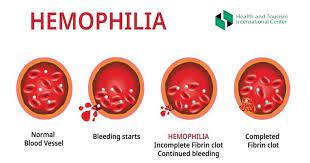Health experts have called for increased awareness on hemophilia disease to prevent and control the disorder.
The experts made the call on Thursday, during a virtual media round table organised by Pfizer to commemorate World Hemophilia Day.
The World Hemophilia Day (WHD) is celebrated annually on April 17, with a call to action for governments to improve access to treatment and care with an emphasis on better control and prevention of bleeds for all people with bleeding disorders.
The theme for this year’s event is: “Access for All: Prevention of bleeds as the global standard of care”.
Hemophilia is a rare genetic bleeding disorder that causes the blood to take a long time to clot due to a deficiency in one of several blood clotting factors.
According to the World Federation of Hemophilia (WFH), an international not-for-profit organisation, more than 38,000 people worldwide are living with hemophilia B in 2021.
Professor of Hematology and Blood Transfusion, Sulaimon Akanmu, of the Lagos University Teaching Hospital (LUTH), Idi-Araba, called for innovation in access to hemophilia treatments for patients.
He said that hemophilia tends to occur in males due to inherited X chromosomes from the mother.
“People with hemophilia are at risk for excessive and recurrent bleeding from modest injuries, which have the potential to be life threatening.
“People with severe hemophilia often bleed spontaneously into their muscles or joints, or rarely into other critical closed spaces such as the intracranial space, where bleeding can be fatal,” he said.
Akanmu, however, said that knowledge and diagnosis of hemophilia was low among the population and even healthcare workers.
According to him, this is responsible for underdiagnosed hemophilia cases in the country.
“We have lots of work to do to increase awareness of hemophilia among the general population because lots of male children are dying at a young age.
“The moment you sever the umbilical cord and that spot is oozing blood for too long or not healing on time. You can suspect hemophilia.
“Hemophilia Federation of Nigeria is taking steps to sensitise pregnant women and healthcare workers at health centres on the existence of hemophilia and how to identify it in children at young ages,” he said.
The professor further said that the World Federation of Hemophilia (WFH) was working in partnership with hemophilia treatment centres in 29 African countries to share knowledge and build global awareness through information exchange, education and training.
He noted that the WFH provided about 24 million units of clotting factor concentrates per year to patients in sub-Saharan Africa through humanitarian aid programmes.
He added that Pfizer was a visionary partner of the World Federation of Hemophilia for WHD.
Dr Vivian Painstil, the Senior Specialist Paediatrician, Komfo Anokye Teaching Hospital, Kumasi, Ghana, said managing hemophilia could be challenging while people with the disease could leave fairly normal lives with certain precautions to prevent and control bleeds.
“The burden people living with hemophilia B face is significant. Many receive routine infusions or injections which can interfere with their ability to take part in day-to-day activities that others take for granted,” Painstil said.
She called for collaborative efforts to improve diagnosis, affordable treatment, social support and awareness for hemophilia.
Also, Mr Kodjo Soroh, the Medical Director, sub-Saharan Africa, Pfizer, said Pfizer’s goal was to ensure patients living with hemophilia are seen, heard and never forgotten.
Soroh said that Pfizer would continue to work tirelessly to find breakthrough solutions and therapeutic options to change the lives of people living with hemophilia.
“Pfizer’s efforts at advancing treatment for hemophilia and bridge gaps in access to care resonates with this year’s theme of the WHD Access For All: Prevention of Bleeds.
“Pfizer’s commitment to equity and continued investment in hemophilia is evident in its more than 30 years of experience in developing therapies for hematological disorders as it has a deep understanding of the significant challenges that people living with the disease continually face,” he said.
The medical director, therefore, said Pfizer would continue to amplify and celebrate the work of the global hemophilia community as it created awareness on the need for innovation in access to hemophilia treatments.



